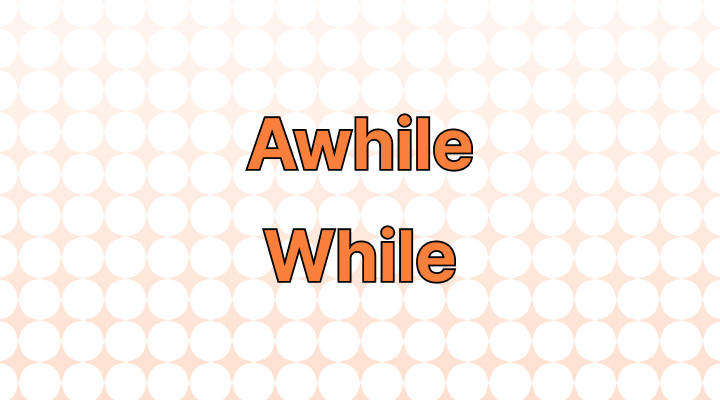"Awhile" is an adverb that denotes a short or brief duration, while "a while" is a noun phrase that refers to an indefinite period of time,
Have you ever been unsure whether to use "awhile" or "a while" in your writing or conversations? These two expressions may seem alike, but understanding the difference between them is crucial for clear and precise communication in English. In this blog post, we'll explore the meanings, distinctions, and correct usage of "awhile" and "a while."
What does Awhile mean?
In contrast, "awhile" is a single adverb that conveys a short duration or brief period of time. Unlike "a while," which implies an indefinite timeframe, "awhile" specifies that something will happen or continue for only a short period.
Example Scenario:
- Let's rest awhile before we continue our journey.
Here, "awhile" suggests a brief pause or rest, emphasizing brevity. It indicates that they intend to take a short break.
More example sentences
- I'll be with you in just a moment; please wait awhile.
- She wanted to rest awhile before continuing her hike in the mountains.
- Let's sit down and chat awhile, catching up on old times.
- The baby finally fell asleep, so we can relax awhile.
- He decided to study awhile longer to prepare for the upcoming exam.
- After a long day at work, I like to unwind by reading awhile.
- Can you hold onto this package for me awhile? I'll be right back.
- We've been driving for hours; let's pull over and rest awhile.
- I need to think about it awhile before making a decision.
- The rain stopped, so we can go for a walk awhile before dinner.
What does A While mean?
"A while," when written as two separate words, functions as an adverbial phrase, denoting a period of time. It signifies an indefinite or unspecified duration, emphasizing time without specifying its exact length. "A while" typically follows a preposition.
Example Scenario:
- I haven't seen you in a while.
In this context, "a while" emphasizes the absence of interaction over an unspecified period. It suggests that some time has passed since the last meeting or encounter.
More example sentences
- I haven't seen you in a while; it's great to catch up.
- Let's wait for a while before making a decision.
- After studying for a while, he finally understood the concept.
- She enjoyed reading a book for a while in the peaceful garden.
- It takes quite a while to bake a homemade pie from scratch.
- We need to rest for a while before continuing our journey.
- After living in the city for a while, she longed for the tranquility of the countryside.
- Can you stay with me for a while? I could use some company.
- It may be a while before we receive a response to our job applications.
- He practiced the piano for a while every day to improve his skills.
Differentiating AWhile and A while
The primary distinction between "a while" and "awhile" lies in their structure and how they communicate time:
- "Awhile" is a single adverb indicating a short or brief duration. Choose it when you wish to convey that an action or state will last only for a short period.
- "A while" consists of two separate words and signifies an indefinite or unspecified period of time. Use it when expressing that something occurred or will occur over an unspecified span.
Common Idioms and Phrases with AWhile and A while
While "a while" and "awhile" aren't idiomatic themselves, they play pivotal roles in various idiomatic expressions that revolve around time, duration, and breaks. Here are some idioms and phrases featuring these terms:
- After a while: Refers to something happening or being done after a considerable, often unspecified, amount of time. Example: "After a while, I realized the importance of time management."
- Every once in a while: Indicates that something occurs at irregular intervals or infrequently. Example: "Every once in a while, we like to treat ourselves to a special meal."
- Take a while: Implies that a task or action will require a significant amount of time to complete. Example: "Fixing this old car will take a while, but it's worth it."
- A while back: Refers to a point in time that occurred some time ago. Example: "I remember reading that book a while back; it was quite enjoyable."
Synonyms for AWhile and A while
- "For a short time": Can replace "awhile" to convey a brief period.
- "For some time": Can be used interchangeably with "a while" to indicate an unspecified duration.
By grasping the nuances between "awhile" and "a while," you'll enhance your language skills and effectively convey your intended meaning. These expressions are indispensable for expressing time duration and brevity, ensuring clarity and precision in your writing and conversations. Whether you're discussing an uncertain timeframe or emphasizing a short break, selecting the appropriate term is essential for clear and effective communication in English.
Discover more about the AI English proofreader, Engram!

Reference














